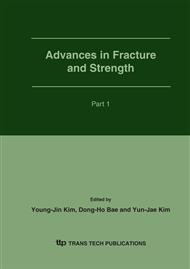p.1350
p.1356
p.1365
p.1371
p.1376
p.1382
p.1388
p.1395
p.1401
Analysis of the Failure of Turbocharger Shaft Bearing in Diesel Engines
Abstract:
A sudden failure of the bearing of the turbocharger shaft in a diesel engine, with the power of 11520KW and the total running time of 2,417h, is investigated in this paper. Based on an examination of the disassembled turbocharger and a residue analysis, it was found that the failure of the turbocharger originated from a fatigue fracture of an aluminum-alloy bearing retainer (cage) on its compressor side. The axial load was a chief cause of the fatigue fracture and the looseness defects in the aluminum alloy retainer deteriorated its fatigue strength which in turn accelerated the development of fatigue cracks. After the retainer broke, the off-centered rotation of the turbocharger shaft triggered a severe impact and led to deformation, wear and a fracture of the bearing parts, ultimately resulting in the failure of the turbocharger.
Info:
Periodical:
Pages:
1376-1381
Citation:
Online since:
November 2005
Authors:
Price:
Сopyright:
© 2005 Trans Tech Publications Ltd. All Rights Reserved
Share:
Citation:


